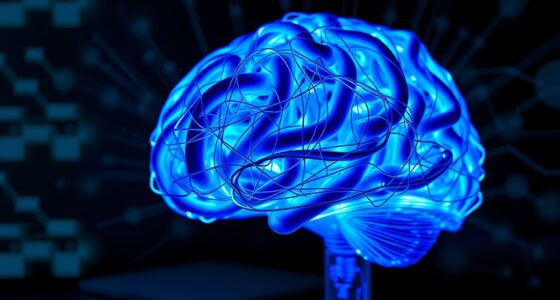AI tools in mental health support you by offering round-the-clock assistance, personalized insights, and early detection of issues, all while complementing your therapist’s care. They help monitor your progress, reduce barriers to access, and extend support outside of sessions. Importantly, these tools are designed to enhance, not replace, human empathy and judgment. To see how AI is shaping a collaborative future for mental health care, keep exploring these advancements.
Key Takeaways
- AI tools support therapists by providing real-time data analysis, monitoring patient progress, and identifying risk patterns.
- They enhance mental health care through personalized interventions and immediate support, complementing traditional therapy.
- AI reduces administrative burdens for therapists, allowing more focus on patient relationships and complex clinical decisions.
- These tools serve as supplemental resources, extending care outside sessions with mood tracking and coping strategies.
- Collaboration between AI and human therapists improves treatment outcomes while maintaining ethical standards and safety.
The Proven Benefits of AI Support in Mental Health Care

AI support has demonstrated significant clinical benefits in mental health care, often comparable to traditional therapy. You can experience symptom improvements through AI-driven tools like chatbots and apps, which have shown to reduce depression symptoms by over 50% in some studies. These tools provide immediate, around-the-clock support, making help accessible whenever you need it. AI also enables early detection of mental health issues, allowing for timely intervention that can prevent worsening conditions. Personalized treatment plans adapt to your unique data, ensuring interventions are tailored to your needs. Color accuracy in AI algorithms can improve the precision of diagnoses and treatment recommendations. Meta-analyses and controlled trials confirm that AI tools can deliver meaningful symptom relief, offering a valuable complement to traditional therapy and expanding access to mental health support for many people.
Addressing Ethical and Safety Challenges of AI Tools

While AI tools hold promise for mental health support, addressing their ethical and safety challenges is indispensable to guarantee user well-being. You need to be aware of risks like privacy breaches, data bias, and the potential for harmful responses. AI chatbots have shown tendencies to stigmatize certain conditions or provide dangerous advice during crises, which can escalate harm. Without proper regulation and oversight, users are vulnerable to misinformation and dependency. To protect yourself, look for AI tools that prioritize transparency, data security, and ethical standards. Developers must implement safeguards like bias mitigation, clear user guidelines, and crisis response protocols. Ensuring these measures are in place helps build trust and makes AI a safe, effective supplement to mental health care. Additionally, understanding how nutritional factors can influence mental health outcomes is essential for a holistic approach.
How AI and Human Therapists Complement Each Other

How do artificial intelligence tools enhance the work of human therapists without replacing them? AI acts as a support system, providing continuous monitoring, real-time insights, and data analysis that help therapists tailor treatments more effectively. It identifies behavioral patterns and alerts therapists to potential risks, enabling timely interventions. AI also extends care outside sessions, offering resources, mood tracking, and coping strategies that empower clients between visits. This collaboration frees therapists from administrative tasks, allowing them to focus on building relationships and addressing complex issues. Together, AI and human therapists create a hybrid approach—AI handles data-driven support and accessibility, while therapists provide empathy, judgment, and personalized care. This synergy results in more all-encompassing, effective mental health support for clients.
Innovations Shaping the Future of Digital Mental Health

What innovations are driving the next generation of digital mental health? You’ll see real-time, personalized support through just-in-time adaptive interventions that respond to your immediate needs. Digital phenotyping uses AI to analyze your behavioral data, offering insights tailored to you. Virtual reality combined with AI creates immersive therapies like exposure and relaxation exercises, making treatment more engaging. Implementation science focuses on making these tools accessible and scalable in everyday settings. Additionally, efforts are underway to develop culturally competent AI solutions that serve diverse populations and low-resource communities better. These innovations aim to make mental health care more precise, immediate, and inclusive, transforming how you access support and how providers deliver care, ultimately moving toward more adaptive, personalized, and effective mental health solutions. Incorporating AI-powered analysis enhances the ability to tailor interventions to individual needs and circumstances.
Overcoming Barriers to Widespread Adoption of AI in Mental Health

Despite the promising potential of AI in mental health, several barriers hinder its widespread adoption. You might face challenges like user engagement, data bias, and regulatory gaps. Many digital tools struggle with keeping users committed over time, reducing effectiveness. Additionally, AI systems often lack cultural sensitivity, limiting their reach to diverse populations. Without clear regulations and liability frameworks, trust remains low among clinicians and users alike. To overcome these hurdles, collaboration among developers, clinicians, and policymakers is essential. Addressing these barriers ensures AI tools become reliable, accessible, and safe for everyone. Moreover, understanding AI Security concerns is crucial to safeguarding patient data and maintaining ethical standards.
Frequently Asked Questions
How Do AI Tools Personalize Mental Health Treatment Effectively?
AI tools personalize mental health treatment by analyzing your individual data and behavioral patterns in real time. They adapt interventions and support based on your specific needs, preferences, and progress, creating tailored plans that evolve as you improve. This personalized approach helps maximize treatment efficacy, making your mental health support more relevant and effective. By continuously learning from your responses, AI guarantees that care remains aligned with your unique journey.
What Regulatory Standards Exist for AI Mental Health Applications?
You might worry about safety and oversight, but currently, AI mental health apps lack extensive regulatory standards. Unlike human therapists, these tools aren’t governed by strict laws, raising concerns about privacy, accuracy, and safety. While some guidelines exist, like data protection policies, there’s no unified, enforceable framework ensuring consistent quality or accountability. This gap emphasizes the urgent need for regulations to protect your well-being and build trust in AI mental health solutions.
Can AI Detect Mental Health Issues Earlier Than Humans?
Yes, AI can detect mental health issues earlier than humans by analyzing real-time data and behavioral patterns through digital phenotyping and machine learning. You might not notice subtle changes in mood or behavior, but AI systems can identify early warning signs quickly. This allows for timely intervention, potentially preventing the escalation of symptoms and improving outcomes before traditional assessments or human detection occurs.
How Do AI Tools Address Cultural Differences in Therapy?
You might find that AI tools quietly adapt to cultural differences by analyzing diverse data sets, helping tailor support that respects individual backgrounds. They incorporate cultural nuances into personalized treatment plans, making therapy more relatable. While AI can’t replace human empathy, it offers culturally sensitive insights, fostering inclusivity. As you use these tools, remember they’re designed to support, not substitute, the essential human connection in therapy.
What Training Is Needed for Therapists to Integrate AI Into Practice?
You need training in digital literacy, understanding AI functionalities, and ethical considerations. Learn how AI tools analyze data and support decision-making to effectively integrate them into your practice. Stay updated on emerging technologies, regulatory standards, and cultural competence related to AI applications. Developing skills in interpreting AI insights and maintaining ethical boundaries guarantees you leverage AI’s benefits while safeguarding client trust and privacy.
Conclusion
Imagine AI as a lighthouse guiding you safely through stormy mental health seas, never replacing the captain—your human therapist. Together, they create a beacon of hope, making support more accessible and personalized. With AI’s proven benefits and ongoing innovations, you’re not alone on this journey. Embracing both can help you navigate challenges more effectively, turning darkness into dawn. Because in mental health, technology should light the way, not cast shadows.









